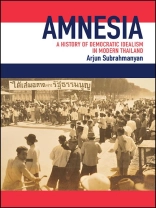Thailand’s monarchy and military have dominated the narrative of the country’s modern history, and their leadership is often accepted as evidence of a cultural preference for authoritarianism. Despite a long history of military coups that have upended the course of the country’s democracy, however, Thailand’s democratic history is a vital though largely ignored aspect of modern Thai society. Based on extensive archival research,
Amnesia delves into the social and political beginnings of Thai democracy and explains how a bloodless revolution against the monarchy in 1932 introduced a constitutional democracy and ignited enduring hopes for a fairer society and a more representative government. The ‘People’s Party, ‘ a small group of commoners who staged the revolution in the name of democracy, found an enthusiastic audience for their bold populist rhetoric among wide swathes of society. In
Amnesia, Arjun Subrahmanyan illustrates how the idealism of the first decade of Thai democracy, now largely forgotten, still shapes Thai society.
Tabla de materias
List of Illustrations
Acknowledgments
Thai Language Conventions
Introduction: The 1932 Revolution in Thai History
1. The New Regime and the Old: Compromise, Rebellion, and the Enemies Within
2. A Fragile Alliance: The Working Classes and the People’s Party
3. Spokesmen for the Peasantry: The Revolution and Social Welfare
4. Making Citizens: Education and Propaganda in the New Order
5. Buddhist Democracy in the Revolution
6. The Revolution Betrayed: Triumph and Tragedy in Assembly Politics
Conclusion
History beyond Royalism
Notes
Bibliography
Index
Sobre el autor
Arjun Subrahmanyan is Senior Lecturer in Southeast Asian History at Murdoch University in Perth, Western Australia.












